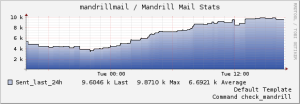Table of Contents
check_mandrill.pl
Background
This plugin checks the status of mail volumes sent through the Mandrill mail server. It checks for a minimum number of messages sent and alerts if the number is less than the warning/critical thresholds. If it is expected that mail is sent on a regular basis, if less than the expected amount is sent it may indicate a problem on Mandrill, most likely billing or reputation related. You should be checking the mail host which sends to the Mandrill API to check that it is working in addition.
Also, this checks for a backlog on Mandrill which represents queued mail which has been sent from the API but not delivered. Values from the API which give messages opened and rejected are also presented, but as they are not certain to be correct, they are not alerted on.
Status info is provided which allows pretty graphs to be drawn:-

The backlog graph for me is showing zero, so it is not reproduced here.
Plugin Code
#!/usr/bin/perl #Written Andrew Stringer 13/08/2015 onwards contact me on:- nagios atsymbol rainsbrook dot co dot uk #Purpose is to check the number of mails sent through Mandrill. #This uses the Mandrill API to get results as xml and parses them. #History #v0.1 testing of concept. #v0.2 first working version, no alerting, just reporting. #v0.3 Added thresholds and low volume warnings. #v0.4 Added check for invalid API key. #v0.5 Added high volume warning threshold. #v0.6 Added backlog thresholds #This check should output the number of messages sent and rejects in the last day #and the last week. #output should show performance data, eg:- #print "OK - Messages sent is xxxx, rejects is yyyy | Sent=$SENT, Rejects=$REJECTS;${LOWWARNINGTHRESHOLD};${LOWCRITICALTHRESHOLD}" #23-09-2015 - Added in code to report incorrect API key used. #Also, Happy Birthday Father, 91 today! #26-10-2015 - Added to code to handle high threshold warning and backlog warnings #To-Do:- #pipe xml curl output directly to xml::simple inlut, avoiding /tmp #$USER1$/check_mandrill.pl $ARG1$ $ARG2$ $ARG3$ $ARG4$ #$ARG1$ is the Mandrill api key #$ARG2$ is the low volume warning threshold for 24h #$ARG3$ is the low volume critical threshold for 24h #$ARG4$ is the high volume warning threshold for 24h #$ARG5$ is the high volume critical threshold for 24h #$ARG6$ is the backlog warning threshold #$ARG7$ is the backlog critical threshold use strict; use warnings; use XML::Simple; use Data::Dumper; MAIN: #start of body of program { my $numArgs = $#ARGV + 1; if ($numArgs < 7) { print "You supplied $numArgs arguments.\n"; print "Usage:- check_mandrill.pl <API key> <low-warning> <low-critical> <high-warning> <high-critical> <backlog-warn> <backlog-critical>\n"; exit 3; } #This is the xml file retreived from Mandrill, #it should be possible to read this into an array or something rather than #write it out to the filesystem. my $resultsfile = '/tmp/mandrill.xml' ; #These need to be read in as a command line variable from Nagios ($ARG1$ etc.) my $apikey = $ARGV[0]; my $lowwarning = $ARGV[1]; my $lowcritical = $ARGV[2]; my $highwarning = $ARGV[3]; my $highcritical = $ARGV[4]; my $backlogwarning = $ARGV[5]; my $backlogcritical = $ARGV[6]; my $mandrillurl = 'https://mandrillapp.com/api/1.0/users/info.xml'; #Set default return code to 0 my $rcode = 0; #get xml file `curl -s -A 'Mandrill-Curl/1.0' -d '{"key":"$apikey"}' $mandrillurl > $resultsfile` ; # create object my $xml = new XML::Simple; # read XML file my $data = $xml->XMLin("$resultsfile"); #Checks to showup any problems my $message = $data->{message}->{content} ; if (defined $message) { if ($message eq 'Invalid API key'){ print"Invalid API key.\n"; exit 3; } } #print Dumper($data); my $sent24h = $data->{stats}->{today}->{sent}->{content}; my $open24h = $data->{stats}->{today}->{opens}->{content}; my $reject24h = $data->{stats}->{today}->{rejects}->{content}; my $sent7d = $data->{stats}->{last_7_days}->{sent}->{content}; my $open7d = $data->{stats}->{last_7_days}->{opens}->{content}; my $reject7d = $data->{stats}->{last_7_days}->{rejects}->{content}; my $currentbacklog = $data->{backlog}->{content}; # Print out data and return codes #OK if (($sent24h >= $lowwarning) && ($sent24h <= $highwarning) && ($currentbacklog <= $backlogwarning )) { print "OK - $sent24h mails in last 24h, $sent7d in last 7d|"; $rcode = 0; #Critical } elsif ($sent24h <= $lowcritical) { print "CRITICAL - Less than $lowcritical mails sent in last 24h|"; $rcode = 2; } elsif ($sent24h >= $highcritical) { print "CRITICAL - Greater than $highcritical mails sent in last 24h|";$rcode = 2; } elsif ($currentbacklog >= $backlogcritical) { print "CRITICAL - Backlog on Mandrill greater than $backlogcritical|"; $rcode = 2; #Warnings } elsif ($sent24h <= $lowwarning) { print "WARNING - Less than $lowwarning mails sent in last 24h|"; $rcode = 1; } elsif ($sent24h >= $highwarning) { print "WARNING - Greater than $highwarning mails sent in last 24h|"; $rcode = 1; } elsif ($currentbacklog >= $backlogwarning) { print "WARNING - Backlog greater than $backlogwarning|"; $rcode = 1; } else { print "UNKNOWN - No idea how many mails sent, debugging needed!|"; $rcode = 3; } print "Sent last 24h=$sent24h;$lowwarning;$lowcritical, Open last 24h=$open24h, Reject last 24h=$reject24h, Backlog on Mandrill=$currentbacklog;$backlogwarning;$backlogcritical"; print "\n"; #Remove xml file from /tmp unlink $resultsfile ; exit $rcode; #end of main: }
First a command definition:-
# 'check_mandrill' command definition
define command{
command_name check_mandrill
#'$ARG1$'is API key, '$ARG2$' is warning threshold for min sent mail, '$ARG3$' is critical threshold for min sent mail
#'$ARG4$ is max mail warning, '$ARG5$' is max mail critical, '$ARG6$' is warning backlog, '$ARG7$' is critical backlog
command_line /usr/lib/nagios/plugins/check_mandrill.pl '$ARG1$' '$ARG2$' '$ARG3$' '$ARG4$' '$ARG5$' '$ARG6$' '$ARG7$'
}
Use this as a service definition:-
#Services
define service {
use generic-service
host_name mandrillmail
service_description Mandrill Mail Stats
check_command check_mandrill!YOUR-API-KEY!150!75!8000!9000!10!20
#contact_groups unixadmin
check_interval 1
retry_interval 1
}
To Do
The shell out to curl and saving files in /tmp is probably not the best way to write perl, this should be replaced.
Finally....
And before you ask, this was not written to facilitate sending spam email, it was done to monitor a legitimate mail sending application.
